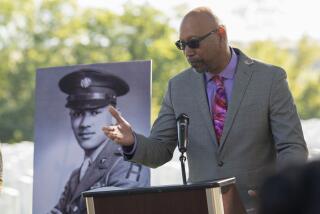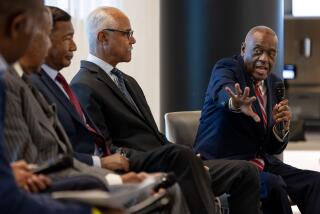Vernon Baker dies at 90; Medal of Honor recipient for WWII battlefield valor
- Share via
Vernon Baker, a black U.S. soldier who belatedly received the Medal of Honor for his World War II battlefield valor after a study concluded that he had been wrongly denied the military’s top award because of his race, died at his home near St. Maries, Idaho. He was 90.
Baker died Tuesday of complications from brain cancer, said Ron Hodge, owner of Hodge Funeral Home in St. Maries.
In 1997, Baker was the lone survivor among just seven black soldiers selected to receive the nation’s highest award for battlefield valor 52 years after the war ended.
After then- President Clinton presented it to him in a White House ceremony, Baker told the Washington Post: “The only thing that I can say to those who are not here with me is, ‘Thank you, fellas, well done. And I will always remember you.’ ”
On April 5, 1945, Lt. Baker was leading 25 black infantrymen through a maze of German bunkers and machine gun nests near the coastal town of Viareggio, Italy.
He crawled under machine-gun fire to destroy a gun emplacement, killing three Germans, then attacked an observation post and killed two more. Baker and a fellow soldier attacked two more machine gun nests, killing or wounding four more enemy soldiers.
When it was time to evacuate the wounded, Baker purposely drew enemy fire. The following night, he voluntarily led a battalion advance through enemy minefields and heavy fire.
The segregated unit’s commander, who was white, left for reinforcements and never returned. Baker later said the commander had abandoned his men.
“It made me all the more determined to accomplish our mission,” he told the PBS series “American Valor.” “Because at that time the Army was segregated. It was thought that we were unable to fight.”
No black soldiers were awarded the Medal of Honor during World War II, although Baker did receive the Distinguished Service Cross, the Army’s second-highest award for bravery.
In 1993, Army officials contacted Shaw University, a historically black college in Raleigh, N.C., to study whether there was a racial disparity in the way Medal of Honor recipients were selected.
The study concluded that the political climate and common Army practices guaranteed that no black soldier would ever receive the award. The researchers recommended that 10 soldiers receive the medal, and the Army chose seven from that list.
But since the statutory limit for presentation had expired, Congress was required to pass legislation that allowed the president to award the Medals of Honor so many years after the action.
Initially, Baker had been rebuffed when he tried to join the Army in 1941. A recruiter told him there was no quota for enlisting “you people,” he said later.
Reflecting on life in a segregated Army unit, he told the Post: “I was an angry young man. We were all angry. But we had a job to do, and we did it.”
Born in 1919 in Wyoming and orphaned as a young child, Baker was raised by his grandparents there. He was working as a railroad porter when he joined the Army and remained in the military until 1968.
He worked for the American Red Cross before retiring to Idaho.
When he received a call telling him he was to receive the Medal of Honor, at first he was astonished, then angry.
“It was something that I felt should have been done a long time ago,” he told Idaho public television. “If I was worthy of receiving the Medal of Honor in 1945, I should have received it then.”
His survivors include his wife, Heidy; a stepdaughter; and a grandson.
More to Read
Start your day right
Sign up for Essential California for the L.A. Times biggest news, features and recommendations in your inbox six days a week.
You may occasionally receive promotional content from the Los Angeles Times.






